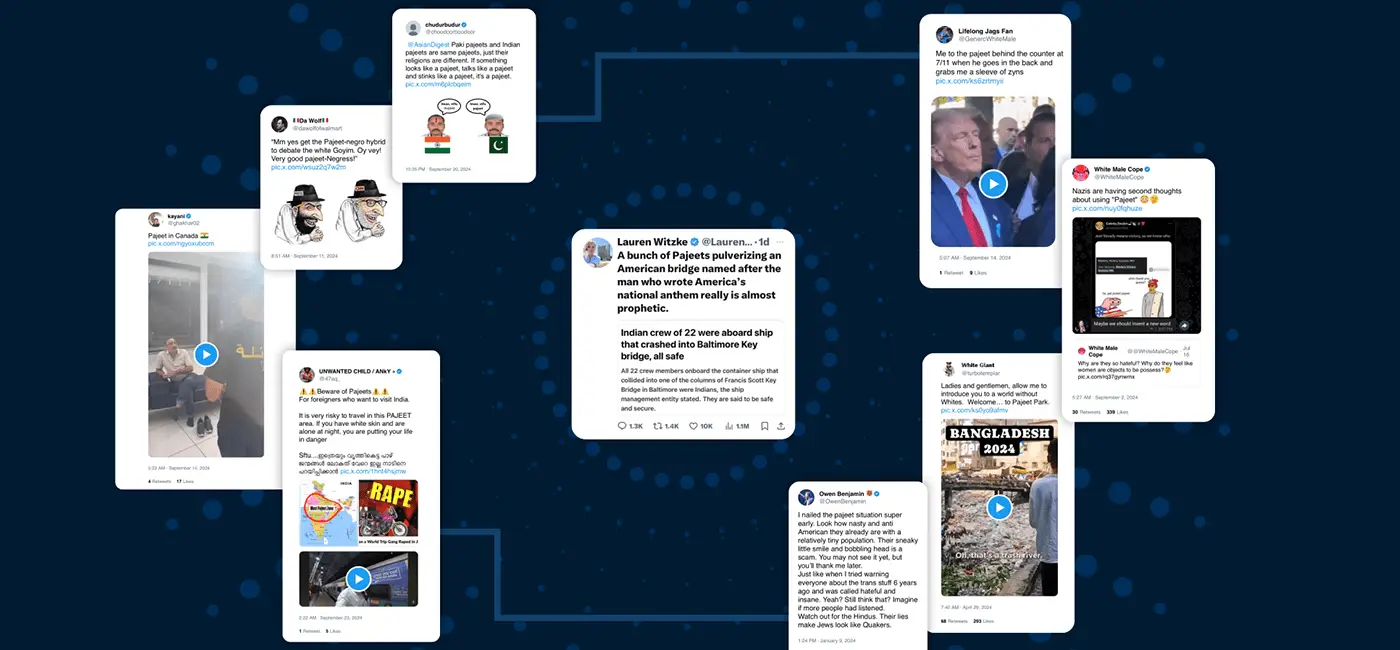Since billionaire Elon Musk purchased Twitter in 2022, renaming it X, the site, already a troubled source of disinformation, prejudice, and hate speech, has sunk to a new low. Despite his claim to make Twitter a genuine free speech zone, warts and all, such as through his policy of resuscitating banned accounts, Musk has been anything but consistent in carrying through on his promise, whether globally or in the United States. Despite Musk’s protestations to the contrary, hate speech is growing on the platform, with white supremacist and overly racist accounts, sentiment, and content flourishing unchecked.
The Global Project Against Hate and Racism notes the explosion of online racism targeting South Asians since 2023 on platforms such as Telegram, Donald Trump’s Truth Social, Gab, and Facebook. X is no exception. A basic examination of the figure of the ‘Pajeet,’ a trope that targets Indian immigrants in the West, Indians at large, and Indian culture, reveals that racist discourse about Indians on X typically involves two dimensions, with the same dynamic likely holding for other non-white groups and other platforms as well.
One, such content draws on a broader substratum of far-right discourse that exists well beyond the online realm. This wider economy of prejudice and hate traffics in generic stereotypes such as the lazy, thieving immigrant, the unpatriotic minority, or the individual marked by aberrant physical characteristics that signify moral failing as well inherent cultural and genetic inferiority. And two, racist discourse about the group centers on particular stereotypes related to the country, community, and people in question.
Reportedly, the term ‘Pajeet’ appears to have originated in 2015 on the notorious site 4Chan, to describe Indian and Sikh men, gaining broader currency in the 2020s. The term, it is worth noting, is not a common Indian name or descriptor. Phonetically, it can be parsed as a combination of ‘Paaji,’ a Punjabi word of respect that means older brother, and ‘Jeet,’ an Indian name that is used by itself or forms part of longer names such as Amarjeet or Ranjeet. The idea of Indians as people who defecate in the open, including in public spaces, is central to the stereotype of the ‘Pajeet.’ The ‘Pajeet’ is typically depicted as a dark-skinned immigrant, not just unhygienic but uncivilized, unable or unwilling to abide by the norms of his new society and a demographic threat to a usually white majority population.
Much of the discourse of the ‘Pajeet’ on X appears to emanate from the US and Canada, unsurprising at a time when conspiracies such as the Great Replacement Theory, or the belief that there is an organized attempt to replace supposedly ‘native’ white populations with non-white immigrants, have gripped the imagination of the far right in these societies, with often devastating consequences.
The ‘Pajeet’ is also described as violently misogynistic, fixated on cows, and a threat to white women. References to curry, the IT industry, illegal migration, and visa fraud are often thrown in for good measure. A simple search for the term ‘Pajeet’ on X throws up a list of tweets that reflect these themes to varying extents. Combining the term ‘Pajeet’ with ‘immigration,’ ‘defecation,’ or ‘cows’ for more specific searches generates more racist content along these lines.
Even a cursory examination of the history of anti-immigrant prejudice and discrimination against minorities in any society will reveal that these traits have been ascribed to numerous groups seen as outsiders, including Irish and Italian immigrants in the US, South Asians in the UK, African-Americans, Blacks in South Africa, Muslims and Dalits in India, Hindus in Bangladesh and Pakistan, Jewish communities in European countries, Palestinians in their occupied homeland, and, as we speak, Haitians in America.
Given that the use of such terms in physical spaces, including workplaces, educational settings, or supermarkets, is a violation of law, policies, and social norms, it is astonishing that their free use is not just allowed to go unchecked but actually encouraged on X in the name of free speech. The solution may not be blanket censorship, but addressing the problem requires close scrutiny of an underlying assumption: that online discourse, such as on X, falls within the realm of representation akin to books or films that may offend people rather than more closely resembling direct speech in non-mediated settings.
Beyond the issue of holding platforms such as X accountable, an urgent matter for South Asians of all stripes to consider is that the racism embodied in terms such as ‘Pajeet’ is complicated by the vexed internal politics of South Asian communities whether located in South Asian countries or outside. Slurs, such as ‘Pajeet’ or ‘Paki,’ a racist term for Pakistanis originating in Britain, are often used by members of South Asian communities against each other, with Hindus, Sikhs, and Muslims, or Indians and Pakistanis, or pro-Khalistan Sikhs and Hindus, freely using these words as they trade insults with each other online. The irony, of course, is that white supremacist accounts often use the same slurs and hateful tropes interchangeably for Hindus, Muslims, Sikhs, and Christians, as, indeed, for anyone from South Asia.
In using the same language to denigrate each other, South Asians become instruments of white supremacy and racism but also victims all over again, exposing themselves and their fellow community members to abuse and the risk of real physical harm. And they feed the monster of prejudice and hate on X and other platforms that keep these companies operationally and financially ticking.
(Rohit Chopra is a Professor in the Department of Communication at Santa Clara University and is a Visiting Scholar at the Center for South Asia at Stanford University for the 2024-25 academic year.)
